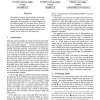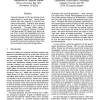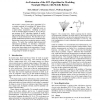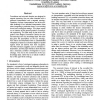IJCAI
2003
14 years 1 months ago
2003
Emerging Web standards promise a network of heterogeneous yet interoperable Web Services. Web Services would greatly simplify the development of many kinds of data integration and...
IJCAI
2003
14 years 1 months ago
2003
We propose a purely logical framework for planning in partially observable environments. Knowledge states are expressed in a suitable fragment of the epistemic logic S5. We show h...
IJCAI
2003
14 years 1 months ago
2003
This article presents a high-level discussion of some problems that are unique to web search engines. The goal is to raise awareness and stimulate research in these areas.
IJCAI
2003
14 years 1 months ago
2003
Symmetry breaking in CSPs has attracted consid erable attention in recent years. Various general schemes have been proposed to eliminate sym metries during search. In general,...
IJCAI
2003
14 years 1 months ago
2003
A corpus-based knowledge representation system consists of a large collection of disparate knowledge fragments or schemas, and a rich set of statistics computed over the corpus. W...
IJCAI
2003
14 years 1 months ago
2003
A longstanding goal in planning research is the ability to generalize plans developed for some set of environments to a new but similar environment, with minimal or no replanning....
IJCAI
2003
14 years 1 months ago
2003
The iterative closest point (ICP) algorithm [2] is a popular method for modeling 3D objects from range data. The classical ICP algorithm rests on a rigid surface assumption. Build...
IJCAI
2003
14 years 1 months ago
2003
The success of the Semantic Web crucially depends on the easy creation, integration and use of semantic data. For this purpose, we consider an integration scenario that defies co...
IJCAI
2003
14 years 1 months ago
2003
Formalisms and axiomatic theories are designed to support reasoning, they are often intended with a preferred interpretation and a targeted ontology. Questions of proper interpret...
IJCAI
2003
14 years 1 months ago
2003
We have created LADDER, the first language to describe how sketched diagrams in a domain are drawn, displayed, and edited. The difficulty in creating such a language is choosing...




